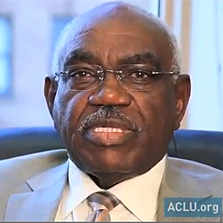For a Pioneering Jurist, Alabama Anti-Immigrant Law Is Spark for a New Civil Rights Struggle


U. W. Clemon marched in demonstrations alongside Dr. Martin Luther King Jr., worked on desegregation in Alabama and became the state's first African-American federal judge. He has seen great advancement of civil rights, but is very concerned about their present state.
"We are at a point in American history where powerful forces are determined to turn back the clock on the tremendous progress we made in civil rights over the last 100 years," Clemon told me when I visited him recently in Birmingham. "And they've come very far in doing so."
Clemon said that HB 56, Alabama's anti-immigrant law, exemplifies a new civil rights crisis.
"The Alabama immigration law was designed to be the most severe, the harshest immigration law in the country," he said. "The design, purpose of it was to drive out people who don't look like us. In this instance it turned out to be Hispanics. Many of them, unfortunately, are American citizens, just as American as you and I."
Please note that by playing this clip You Tube and Google will place a long-term cookie on your computer. Please see You Tube's privacy statement on their website and Google's privacy statement on theirs to learn more. To view the ACLU's privacy statement, click here.
A recent New York Times editorial that quotes Clemon calls HB 56 "the nation's most oppressive immigration law," and the accompanying slide show rightly calls the response to the law "a new civil rights movement."
Parts of the law have been in effect for less than two months, but reports have indicated the legislation has encouraged racial profiling, deterred children from going to school and turned Alabama into a ‘show-me-your papers' state. The ACLU and a coalition of civil rights groups have been challenging the law in the courts.
While the legal battle is ongoing, the harm on the ground has continued. Over the last few days, a mother of two told me she sometimes wakes up in the middle of the night in fear of what could happen if she is separated from her children as a result of the law. An immigrant from Mexico told me he now only goes to the grocery once every couple of weeks because he is afraid he will be pulled over due to racial profiling. A high school senior who was brought here as a one-month-old baby said this country is the only home he has ever known, and is scared his family may be forced to leave.
Clemon, now in his late 60s, said the stories emerging now out of Alabama are disturbing. He now works at a law firm after serving nearly 30 years as a federal judge. He was appointed by President Jimmy Carter in 1980, which turned out to be Alabama's most controversial federal judgeship.
He told me how frustrating it is to see his state pass a law that tramples on civil rights that he and others fought to secure.
"In terms of the basic mean-spirited attitude, it's pretty much the same now as it was then — first it was against blacks and now it's against Hispanics," he said, adding people should speak up against it. "It's very disturbing and that's why I can't go quietly into the night."
Learn more about immigrants' rights: Sign up for breaking news alerts, follow us on Twitter, and like us on Facebook.
Stay informed
Sign up to be the first to hear about how to take action.
By completing this form, I agree to receive occasional emails per the terms of the ACLU's privacy statement.
By completing this form, I agree to receive occasional emails per the terms of the ACLU's privacy statement.

